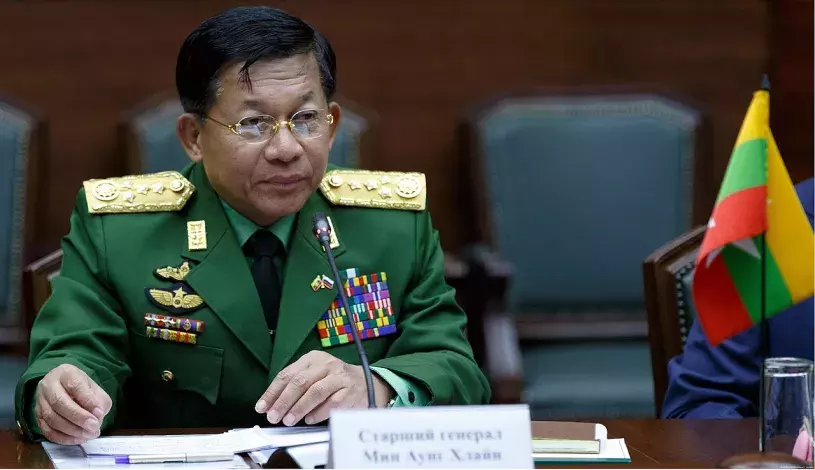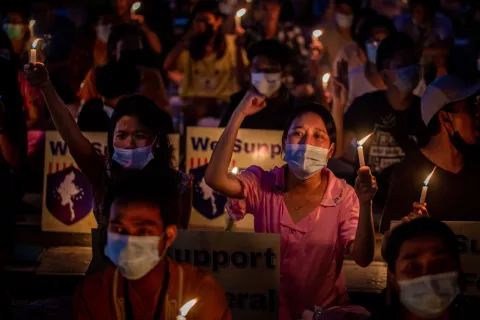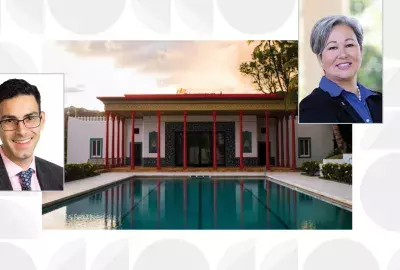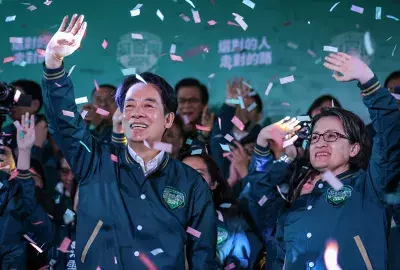Error message

Coup leader Min Aung Hlaing, seen in 2017. Photo: mil.ru via Wikimedia Commons
By Lian Bawi Thang
East-West Center Degree Fellow
Quick Take:
- More than 3,000 protestors have been killed, 20,000 people arrested, and 55,000 houses burned in the two years since the coup.
- Amid former optimism about the prospect of ending military dominance, the ruling NLD party and many observers did not anticipate the coup until the last few months.
- The regime promised to hold "free and fair" elections in 2023, but the repeatedly delayed vote is simply a military strategy to escape the ongoing armed conflict and consolidate authority.
HONOLULU (March 15, 2023) -- Last month marked the second anniversary of the military coup in Myanmar that resulted in the country's devastating civil war, with the military arresting more than 20,000 anti-coup protestors, killing more than 3,000, and burning 55,000 houses and buildings. Meanwhile, Myanmar’s GDP plummeted from an average 6% growth rate during the reform period to negative 18% since the coup.
What was shocking to me about the coup was that almost no one seemed to expect it until the last few months. Throughout the prior decade of reform, the main point of contention among the many lawmakers, political analysts, and activists I met was that "the military had enough power under the 2008 constitution, so why would they need to seize power in a risky coup?"
Indeed, in recent decades the world has seen a decline in outright political coup attempts, which create huge risks for would-be dictators, including foreign intervention, economic sanctions, external pressures, and the growth of internal resistance. To avoid such risks, would-be despots today often attempt instead to weaken all political institutions that support democracy in order to rise to power.
Coup motivations
So what prompted the Tatmadaw, or Myanmar’s military establishment, to risk these consequences? In short, the coup was motivated by both personal and institutional factors.
Institutionally, the military was losing power under democratic reforms even though the political system was rigged heavily in its favor. This in turn threatened the system of military-owned business monopolies that have enriched generals and their cronies for generations.
Soe Thane, a close aide to former President Thein Sein, said in his book that the pace of the political transition made many generals nervous, leading to accusations that certain soft-liners among the governing elites were CIA agents. Meanwhile, the emergence of a political alliance between an ex-general who chaired parliament and the popular civilian opposition leader Aung San Suu Kyi caused concern and disunity among the military leadership.
The Tatmadaw initially attempted through various means to slow the pace of political liberalization, but it was the Rohingya genocide that really shifted Myanmar's trajectory. The military’s clearance operation against Rohingya Muslims beginning in 2017 resulted in mass rape, burnings, drownings, and other violence that killed at least 9,000 people and forced nearly a million to flee the country, according to The New York Times. Little is known about the military's intentions, but it seems clear that the primary objective was to play a greater role in Myanmar's politics by inflaming ethno-religious strife.

Min Aung Hliang’s personal worries
While the military could have anticipated the massive international pressure that would result from the Rohingya tragedy, apparently commander-in-chief —and later coup leader—Senior General Min Aung Hlaing did not seem to expect that demands for international justice would target him so personally. In addition, he was worried about having to relinquish power as a result of Aung San Suu Kyi's unwillingness to raise his mandatory retirement age.
After the NLD won another landslide victory in 2020, the military resorted to allegations of voter fraud. By late 2020, military-affiliated individuals openly speculated about the prospect of a coup as a warning to the NLD. Finally, when the NLD still refused to accept the Tatmadaw’s efforts to retain its power advantages, Min Aung Hlaing orchestrated the coup on Feb. 1, 2021.
NLD and Western miscalculations
Aung San Suu Kyi's administration, which probably underestimated the real prospect of a coup, has faced widespread criticism for failing to prepare for a counter-coup. And policymakers in the West were also too quick to celebrate Myanmar's previous political transition as a partial victory for their foreign policy.
The reform period was never intended to end military domination. It was rather a masterpiece of former dictator Than Shwe's retirement plan. The end of his personalist regime and the competition for successor between two former generals, Parliament Speaker Shwe Mann and President Thein Sein, were mistakenly seen as a prospect of ending military dominance. But when that dominance was threatened by the overwhelming voice of the people in the 2020 election, Min Aung Hlaing and the military establishment sent in the troops to retake it.
The coup clearly reflects the military’s dissatisfaction with its own 2008 constitution, which reserves 25 percent of parliament seats for active military personnel and allows the military commander-in-chief to independently hold three key ministries—the Ministry of Defense, the Ministry of Border Affairs, and the Ministry of Home Affairs.
Since Min Aung Hlaing refuses to engage in dialogue with opposition parties, as required by the five-point ASEAN consensus he agreed to in 2021, holding superficially open elections are his government's best remaining prospect for escaping the ongoing conflict and eventually gaining some degree of international legitimacy. But now, two years after the coup, the regime has again extended its state of emergency and imposed martial law in 37 additional townships, again putting off the election. This step reveals nothing more than the generals’ unquenchable desire for even greater authority than they previously possessed.
Lian Bawi Thang is a PhD student in political science at the University of Hawai‘i at Mānoa, and an East-West Center degree fellow. Follow @Lianbawithang.
Coup leader Min Aung Hlaing, seen in 2017. Photo: mil.ru via Wikimedia Commons
By Lian Bawi Thang
East-West Center Degree Fellow
Quick Take:
- More than 3,000 protestors have been killed, 20,000 people arrested, and 55,000 houses burned in the two years since the coup.
- Amid former optimism about the prospect of ending military dominance, the ruling NLD party and many observers did not anticipate the coup until the last few months.
- The regime promised to hold "free and fair" elections in 2023, but the repeatedly delayed vote is simply a military strategy to escape the ongoing armed conflict and consolidate authority.
HONOLULU (March 15, 2023) -- Last month marked the second anniversary of the military coup in Myanmar that resulted in the country's devastating civil war, with the military arresting more than 20,000 anti-coup protestors, killing more than 3,000, and burning 55,000 houses and buildings. Meanwhile, Myanmar’s GDP plummeted from an average 6% growth rate during the reform period to negative 18% since the coup.
What was shocking to me about the coup was that almost no one seemed to expect it until the last few months. Throughout the prior decade of reform, the main point of contention among the many lawmakers, political analysts, and activists I met was that "the military had enough power under the 2008 constitution, so why would they need to seize power in a risky coup?"
Indeed, in recent decades the world has seen a decline in outright political coup attempts, which create huge risks for would-be dictators, including foreign intervention, economic sanctions, external pressures, and the growth of internal resistance. To avoid such risks, would-be despots today often attempt instead to weaken all political institutions that support democracy in order to rise to power.
Coup motivations
So what prompted the Tatmadaw, or Myanmar’s military establishment, to risk these consequences? In short, the coup was motivated by both personal and institutional factors.
Institutionally, the military was losing power under democratic reforms even though the political system was rigged heavily in its favor. This in turn threatened the system of military-owned business monopolies that have enriched generals and their cronies for generations.
Soe Thane, a close aide to former President Thein Sein, said in his book that the pace of the political transition made many generals nervous, leading to accusations that certain soft-liners among the governing elites were CIA agents. Meanwhile, the emergence of a political alliance between an ex-general who chaired parliament and the popular civilian opposition leader Aung San Suu Kyi caused concern and disunity among the military leadership.
The Tatmadaw initially attempted through various means to slow the pace of political liberalization, but it was the Rohingya genocide that really shifted Myanmar's trajectory. The military’s clearance operation against Rohingya Muslims beginning in 2017 resulted in mass rape, burnings, drownings, and other violence that killed at least 9,000 people and forced nearly a million to flee the country, according to The New York Times. Little is known about the military's intentions, but it seems clear that the primary objective was to play a greater role in Myanmar's politics by inflaming ethno-religious strife.

Min Aung Hliang’s personal worries
While the military could have anticipated the massive international pressure that would result from the Rohingya tragedy, apparently commander-in-chief —and later coup leader—Senior General Min Aung Hlaing did not seem to expect that demands for international justice would target him so personally. In addition, he was worried about having to relinquish power as a result of Aung San Suu Kyi's unwillingness to raise his mandatory retirement age.
After the NLD won another landslide victory in 2020, the military resorted to allegations of voter fraud. By late 2020, military-affiliated individuals openly speculated about the prospect of a coup as a warning to the NLD. Finally, when the NLD still refused to accept the Tatmadaw’s efforts to retain its power advantages, Min Aung Hlaing orchestrated the coup on Feb. 1, 2021.
NLD and Western miscalculations
Aung San Suu Kyi's administration, which probably underestimated the real prospect of a coup, has faced widespread criticism for failing to prepare for a counter-coup. And policymakers in the West were also too quick to celebrate Myanmar's previous political transition as a partial victory for their foreign policy.
The reform period was never intended to end military domination. It was rather a masterpiece of former dictator Than Shwe's retirement plan. The end of his personalist regime and the competition for successor between two former generals, Parliament Speaker Shwe Mann and President Thein Sein, were mistakenly seen as a prospect of ending military dominance. But when that dominance was threatened by the overwhelming voice of the people in the 2020 election, Min Aung Hlaing and the military establishment sent in the troops to retake it.
The coup clearly reflects the military’s dissatisfaction with its own 2008 constitution, which reserves 25 percent of parliament seats for active military personnel and allows the military commander-in-chief to independently hold three key ministries—the Ministry of Defense, the Ministry of Border Affairs, and the Ministry of Home Affairs.
Since Min Aung Hlaing refuses to engage in dialogue with opposition parties, as required by the five-point ASEAN consensus he agreed to in 2021, holding superficially open elections are his government's best remaining prospect for escaping the ongoing conflict and eventually gaining some degree of international legitimacy. But now, two years after the coup, the regime has again extended its state of emergency and imposed martial law in 37 additional townships, again putting off the election. This step reveals nothing more than the generals’ unquenchable desire for even greater authority than they previously possessed.
Lian Bawi Thang is a PhD student in political science at the University of Hawai‘i at Mānoa, and an East-West Center degree fellow. Follow @Lianbawithang.
East-West Wire
News, Commentary, and Analysis
The East-West Wire is a news, commentary, and analysis service provided by the East-West Center in Honolulu. Any part or all of the Wire content may be used by media with attribution to the East-West Center or the person quoted. To receive East-West Center Wire media releases via email, subscribe here.
For links to all East-West Center media programs, fellowships and services, see www.eastwestcenter.org/journalists.







